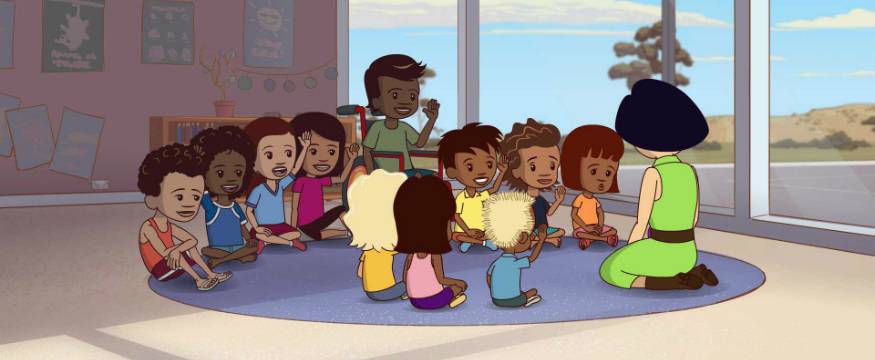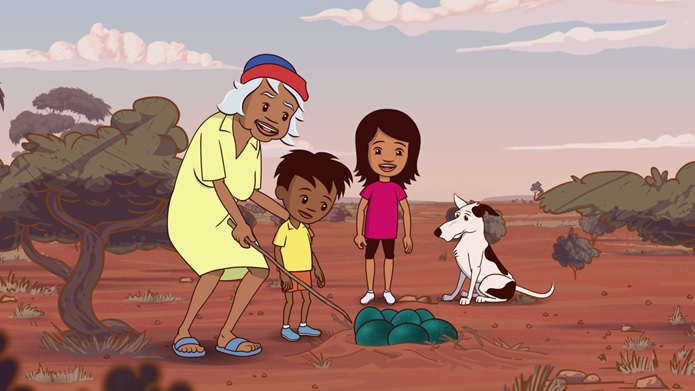
Little J and Big Cuz ready for school
Research 4 Oct 2016 6 minute readA ground-breaking new animated television series aims to support the school readiness of Indigenous children – and the readiness of schools for them.
Little J and Big Cuz ready for school
ACER in partnership with Ned Lander Media, NITV, Screen Australia, Film Victoria, Screen Tasmania and the Australian Children’s Television Foundation will soon launch an original television series that provides Indigenous children with a window into the world of school.
After extensive development, the TV series Little J & Big Cuz is set to be broadcast on NITV in early 2017, towards the end of term one/beginning of term two, with subsequent availability on catch-up TV.
Little J & Big Cuz follows two Aboriginal children who explore the world through the gaps in the back fence. Children viewing the show will follow lead character, Little J, on his adventures as he comes to understand and enjoy the sometimes unfamiliar environment that can be school, and the greater world around him.
The TV series is a fun, animated narrative with voices provided by prominent Indigenous actors including Miranda Tapsell, Deborah Mailman and Aaron Fa’aoso. Episodes are story driven and show the world of school, including show-and-tell, lunchtime, activities and school performances. The educational foundations are implicit rather than explicit – school is simply a part of life.
Little J & Big Cuz trailer from ACER on Vimeo.
Ready children, ready schools
The series is part of a wider School Readiness Initiative whose primary objective is to support a successful transition from home to school for Indigenous children and their families.
Being school ready includes the development of foundational literacy and numeracy skills, engagement in learning, and positive attitudes towards education and school. Of equal importance for students and their families is an understanding of how school works, what is expected of them and what they should expect from school.
The initiative is not just focussed on the child being ready for school, but the school also being ready for the child.
‘Ready schools’ value the skills that Indigenous children bring and recognise the role that families and communities play in supporting a child’s development. They are committed to developing all children’s knowledge, understanding and skills relating to Aboriginal and Torres Strait Islander ways of knowing and being.
Little J and Big Cuz in the classroom
As part of the School Readiness Initiative, ACER is working with support from the Secretariat of National Aboriginal and Islander Child Care (SNAICC), Lotterywest and the Dusseldorp Forum to develop innovative educator resources to support the TV series.
A team of experts convened to develop the resources includes five Indigenous Education Consultants from both the early years and primary school sectors, and a former Senior Education Officer from ACARA.
Tailored to work within pre-schools and primary schools, the resources integrate with the series around episode themes and stories. Importantly, the resources will be mapped to the Early Years Learning Framework and the Australian Curriculum (Foundation – Year 2), and can be used by educators within and outside of the classroom.
Figure 1: A sample Little J & Big Cuz educator resource for F-2
The educator resources will identify the Indigenous knowledge, understandings and skills explored through the episode as well as the relevant curriculum areas addressed. They will also suggest questions and activities that can be attempted following viewing the episode in order for children to engage with, explore, explain, elaborate on and evaluate the episode’s themes and concepts, and provide links to other relevant online resources.
The resources will be freely available via an online database that will allow educators to quickly build their own lesson plans. Educators wishing to find out more can join the Little J & Big Cuz educator community.
At home with Little J and Big Cuz
In the home, the TV series will be supported by web- and print-based early learning resources to encourage children to carry on learning outside of the series. These fun, interactive activities will be provided via a web portal and interactive applications to allow viewing flexibility. Resources for families that will support them in transitioning their children to school are also planned for development.
The animated nature of the series allows re-voicing in Indigenous languages. A small number of major languages will be re-voiced in the first year with further language versions produced in association with interested communities at a later stage.

Little J & Big Cuz with their Nanna and Old Dog. Image © Ned Lander Media 2016
Supporting research
The development of the School Readiness Initiative is being informed by research, including the 2010 report, Using television to improve learning opportunities for Indigenous children, by Dr Michele Lonsdale. The report concludes that educational TV programs can help improve children’s school readiness by building literacy and numeracy skills, cultural awareness, self-esteem and appropriate behaviours, with such educational benefits potentially lasting into secondary school.
The Dusseldorp Forum is providing support for an evaluation of the impact of the School Readiness Initiative for children, communities and schools. A 2016 literature review by Jacynta Krakouer, completed as part of that evaluation, confirms the findings of the original literature review and highlights the evidence underlying the purpose of the series and its selected content, style and format.
Ms Krakouer’s review emphasises the importance of family, community, school and services in achieving school readiness, and notes that improved student-teacher relationships, positive conceptions of school and improved self-confidence are seen as more important for Indigenous students than cognitive skills, literacy skills, social skills and ‘fitting in’ with school cultural expectations.
Results from the evaluation will assist in developing future series of Little J & Big Cuz and will help to tailor resources in order to maximise the overall effectiveness of the initiative.
Further information
Little J & Big Cuz is coming to NITV and classrooms in 2017. To find out more please visit www.littlejandbigcuz.com.au and join the mailing list. The full Little J & Big Cuz website will be launched in line with the series broadcast.
